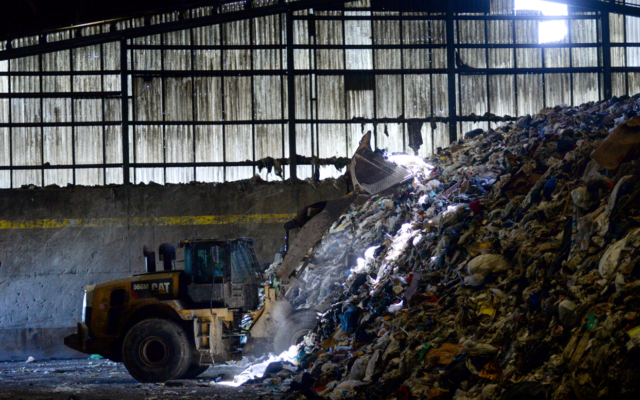
Relief for Greater Bangor’s building trash crisis could come in 2024
By Marie Weidmayer, Bangor Daily News Staff
A 35-year-old trash incinerator closed its doors, a landfill expansion announced it was likely to run out of space, and a waste plant that has been closed for three years is still a year away from reopening.
Few people think about what happens to their trash once they toss it to the curb, but the fate of waste in Greater Bangor found itself on the edge of crisis in 2023. Hundreds of communities in northern and eastern Maine have had to reroute their trash due to waste plant closures and the sludge crisis.
Luckily, there may be relief starting in 2024.
Operations are expected to restart in mid-January at the Orrington plant, while the Hampden plant is scheduled to restart in 2025. The Juniper Ridge landfill may still fill sooner than expected without further action.
Juniper Ridge landfill
This year, 159 municipalities in central and northern Maine were sending their solid waste to the state-owned landfill, leading to an emergency, a state representative and local officials said. Juniper Ridge will run out of room five years faster than expected if the pace continues.
The landfill accepted 72,896 tons of waste in October, the latest month for which a status report is available. Materials such as residues from waste-to-energy facilities, construction debris and wastewater treatment plant sludge are accepted by the landfill.
A partial expansion of Juniper Ridge was expected to last through 2033, but is now expected to be full by 2028, according to a bill proposed by Rep. James Dill, D-Old Town, for the Legislature’s emergency session in January. The problem is caused in part by temporary increases of municipal waste and wastewater treatment plant sludge.
The bill asks for the state to investigate solutions for the solid waste crisis, with findings expected by June 1. The Legislature starts its emergency session Jan. 3.
A crisis with the disposal of wastewater treatment plant sludge came to a head in late February.
Casella, which runs Juniper Ridge, stopped accepting sludge from more than 30 wastewater treatment plants because it was causing the landfill to be unstable.
Canada was accepting the sludge for about four months before reaching a two-year compromise, allowing Casella to accept some out-of-state waste to stabilize the landfill, the Portland Press Herald reported.
When asked whether Juniper Ridge is still filling faster than predicted, Maine Department of Environmental Protection Deputy Commissioner David Madore said an updated waste management and recycling plan will be presented to the Legislature on Jan. 1 and published on the DEP’s website.
Hampden plant
Starting in 2024, the Hampden plant will begin test runs before moving to full operations in 2025, Municipal Review Committee Executive Director Michael Carroll said. The committee that represents 115 Maine communities purchased the plant and found a partner company with the resources to restart operations.
The plant was mothballed when it closed in 2020 but kept its permits. That makes the transition back to operations smoother, Carroll said.
At full operations, the plant is permitted for 180,000 tons of waste per year.
The waste of the 115 municipalities has been going to other facilities while Hampden is closed, but will again be processed at the facility once it reopens, Carroll said.
When the waste bypasses Hampden, it is contracted to go to Crossroads Landfill in Norridgewock, but it can sometimes be sent to Juniper Ridge. If that happens for 100 tons of trash, Juniper Ridge then reroutes that amount to Crossroads, Carroll said.
“At the end of the day, MRC really doesn’t do anything to Juniper Ridge’s capacity,” he said.
Orrington trash incinerator
The Garbage Recycling and Clean Energy plant, or GRACE, in Orrington is in the middle of its eight-week reopening plan. The goal is to start processing trash in mid-January, assuming permits are secured, co-owner Mark Boswell said.
GRACE, formerly known as the Penobscot Energy Recovery Co. plant, was bought by C&M Faith Holdings, a company owned by Boswell and Bill Richardson on Nov. 12. The plant foreclosed in May and stopped accepting trash from Orrington in September.
There was around 10,000 tons of trash in the plant at the time it was purchased, much of which has already been cleared, Boswell said.
Finding a place to sell the generated electricity is another hurdle for C&M Faith Holdings and it is in talks with ISO New England Inc., Boswell said. The plant can’t operate without a place to sell the electricity.
Forty-four communities that will send their waste to GRACE once it’s operational, which is the same number of communities the facility accepted trash from prior to the foreclosure. In 2017, the last full year of operations, the plant processed 315,000 tons of trash.
“We would love to be able to take more than that because we can handle more than that,” Boswell said.